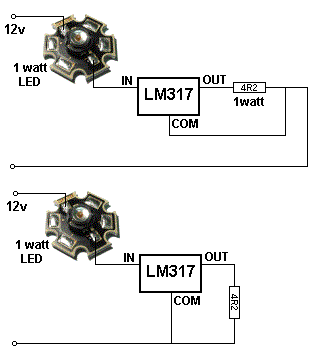LED Driver using 7805
The 7805 can be converted into a content-current device by connecting a resistor as shown below.

As the 12v rises from 0v, the 7805 starts to work and when the input voltage is 4v, the output is 1v as a minimum of 3v is lost across the 7805. The voltage rises further and when the output is 5v, current flows through the 15R resistor and illuminates the LED. The LED starts to illuminate at 3.4v and the voltage across the 15R at the moment is 1.6v and the output current will be 100mA. The input voltage keeps rising and now the output voltage is 7v. The current through the LED increases and now the voltage across the LED is 3.5v. The voltage across the 15R is 3.5v and the current is 230mA.
The input voltage keeps rising and the output voltage is now 8.6v The current through the LED increases and the voltage across the LED is now 3.6v. The voltage across the 15R is 5v and the current is 330mA. The input voltage keeps rising but a detector inside the 7805 detects the output voltage is exactly 5v above the common and the output voltage does not rise any more. The input voltage can rise above 13v or more but the output voltage will not rise.
If the output voltage rises, more current will be delivered to the LED and the voltage across the 15R will increase. The 7805 will not allow this to happen. The LED will have 3.6v across it. The 15R will have 5v across it and the output will be 8.6v.
Using LM317
The 3-Terminal Regulator LM317 is similar to 7805 except the voltage between the COM and OUT is 1.25v instead of 5v. When using an LM317 regulator, less wattage will be lost in the resistor and more heat will be generated via the regulator, when compared with a a 7805 however the total wattage lost will b the same in both cases.

Since the LED and regulator are in series, the LED can be placed before the regulator

Driving a single 1watt LED from 12v is very inefficient. The voltage across the LED will be about 3.6v. The remaining 8.4v must be dropped across the LM317 and 4R2 resistor. The 4R2 must have 1.25v across it for the LM317 to operate and the LM317 has 7.15v across it. The minimum voltage across a LM317 is about 3v and this voltage is required to operate the circuitry inside the
regulator. This means two 1watt LEDs can be placed on a 12v supply and the regulator will run cooler while the circuit will
produce twice the light-output for no additional current.
More on LED drivers on my next post.
